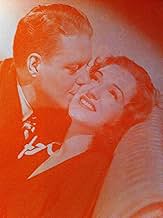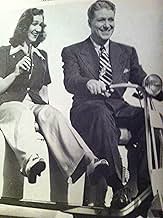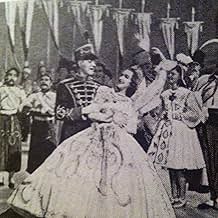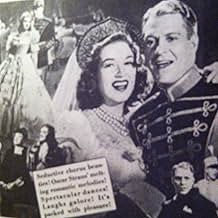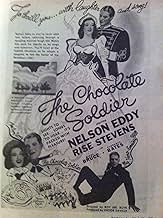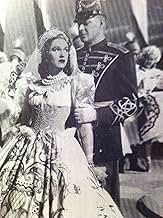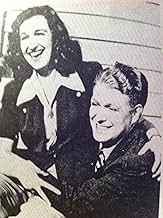Agrega una trama en tu idiomaMaria and Karl Lang are the singing duo of Vienna. Maria is very flirtatious and Karl very jealous. Karl decides to masquerade as a Russian guardsman and attempts to make Maria flirt with hi... Leer todoMaria and Karl Lang are the singing duo of Vienna. Maria is very flirtatious and Karl very jealous. Karl decides to masquerade as a Russian guardsman and attempts to make Maria flirt with him - to test her loyalty to him. As the Russian, Karl makes a vigorous attempt to seduce Ma... Leer todoMaria and Karl Lang are the singing duo of Vienna. Maria is very flirtatious and Karl very jealous. Karl decides to masquerade as a Russian guardsman and attempts to make Maria flirt with him - to test her loyalty to him. As the Russian, Karl makes a vigorous attempt to seduce Maria. For a moment she accepts then rejects him. Karl is left in turmoil.
- Dirección
- Guionistas
- Elenco
- Nominado a 3 premios Óscar
- 3 premios ganados y 3 nominaciones en total
- Magda
- (as Dorothy Gilmore)
- Undetermined Secondary Role
- (sin créditos)
- Singer - 'Seek the Spy' Sequence
- (sin créditos)
- Emile, Voice Coach
- (sin créditos)
- Waiter at the Double Eagle
- (sin créditos)
- Messenger with Note
- (sin créditos)
- Performer in Gypsy Café Sequence
- (sin créditos)
- Stage Manager
- (sin créditos)
- Flute Player
- (sin créditos)
Opiniones destacadas
I will agree that the story about a man suspecting his wife of infidelity is predictable and creaks with age, and the choreography at times was disappointingly unexciting and pedestrian. But putting these flaws aside, this is a truly beautiful and entertaining film. One thing for certain, the production values were simply fabulous. The lavish costumes and beautiful sets were really a wonder to look at. The score is phenomenal, featuring some Oscar Strauss hits like My Hero, Thank the Lord the War is Over, Sympathy and of course the Chocolate Soldier, and some well known opera gems like Mon Couer s'oeuvre a Ta voix from Saint Saens's Samson and Delilah and Evening Star from Wagner's Tannhauser. While my Lady Sleeps was stunning too, but the real highlight was the enormously entertaining Song of the Flea. The performances were sublime; while the beautiful Rise Stevens is probably at her loveliest and sings beautifully, it is the wonderful undervalued Nelson Eddy who steals the show with his beautiful resonant voice and flawless comic timing and stage presence. Nigel Bruce and Florence Bates are good too.
All in all, a beautiful film. Not perfect, but the production values, score and performances make it a treat. 8/10 Bethany Cox
If nothing else, Louis B. Mayer prided himself on bringing class to the cinema and he never met a diva he didn't want to sign for MGM. Eddy, who didn't really get along with Mayer and was soon to leave MGM after a spat with him, I think knew just how much it would cost to sign someone from the outside and he made Mayer spend the dough.
Rise Stevens had appeared with him on radio so Nelson's motives weren't completely to hurt Mayer financially. They worked well together here and maybe they could have been a screen team themselves. Rise Stevens had a good gift for comedy, very much like that other singer/actress Irene Dunne. But after The Chocolate Soldier and an appearance in Going My Way with Bing Crosby, she left the silver screen.
Like the Eddy/MacDonald feature Sweethearts this utilizes the music, but not the plot. Like Sweethearts the leads are appearing on stage in The Chocolate Soldier, but it's a backstage story for the plot. And the plot used is The Guardsman which MGM owned the rights to, having filmed it in 1931 with Alfred Lunt and Lynne Fontanne.
Eddy and Stevens look so good and sing so beautifully on stage, but that doesn't account for Eddy's all consuming jealousy over his wife. His Othello act doesn't even need an Iago for a boost, he's creating all kinds of imaginary lovers for Stevens. Finally he decides to put her to the test, playing a phony Russian opera singer with beard and Cossack costume. Stevens however is up to the challenge and it's a pretty funny film that follows.
The two leads have some nice duets together, particularly the My Hero duet from Oscar Straus's Chocolate Soldier. But the big hits of this film are Moussorgsky's Song of the Flea and another song While My Lady Sleeps written by Bronislau Kaper and Gus Kahn. Both were standard items in Nelson Eddy concerts. Eddy recorded both, however the version I have of the Song of the Flea is in English and in The Chocolate Soldier, Nelson sings it in the original Russian.
It was a good teaming Eddy and Stevens and since right after this Jeanette and Nelson would be doing their last film together, I Married an Angel, it's unfortunate Stevens and Eddy did not do a few more films together themselves.
Dreadful choreography in the musical numbers, but beautiful Oscar Strauss music performed masterfully by Eddy and Rise Stevens, plus `Evening Star' from TANNHAUSER sung gorgeously by Eddy and `My Heart at Thy Sweet Voice' from SAMSON AND DELILAH by Stevens. Even though Stevens has the superior voice, one can't help wishing that Jeanette MacDonald, with her considerable comic gifts, had been available for the part!
¿Sabías que…?
- TriviaThis has interesting origins from musical and non-musical plays. In 1909, the operetta "The Chocolate Soldier" opened in New York. This was based on the non-musical play "Arms and the Man" by George Bernard Shaw. However, Shaw voiced objections to his play being adapted as an operetta. A silent film adaptation, The Chocolate Soldier (1914), based on the New York operetta, omitted any reference to George Bernard Shaw. In 1911, a Hungarian non-musical play "Testör" ("The Guardsman") by Ferenc Molnár, opened in Budapest. In 1941 when this film was made, George Bernard Shaw was still alive. Therefore, the music of the New York operetta and the plot of the Hungarian non-musical play "The Guardsman" were used.
- ErroresWhen Eddy is impersonating a Russian singer, the nightclub impresario introduces him as a bass, but then Eddy sings. He is a baritone.
- ConexionesFeatured in We Must Have Music (1941)
- Bandas sonorasMy Hero
(1909) (uncredited)
Music by Oscar Straus
Musical adaptation by Bronislau Kaper and Herbert Stothart (1941)
Original lyrics by Rudolph Bernauer and Leopold Jacobson
English lyrics by Hugh Stanislaus Stange (as Stanislaus Stange)
Additional lyrics by Gus Kahn (1941)
Sung by Risë Stevens and Nelson Eddy in the show
Hummed a cappella by Florence Bates
Sung by Risë Stevens in the Gypsy Café
Reprised by Risë Stevens and Nelson Eddy in the show at the end
Selecciones populares
Detalles
- Tiempo de ejecución1 hora 42 minutos
- Color
- Relación de aspecto
- 1.37 : 1

